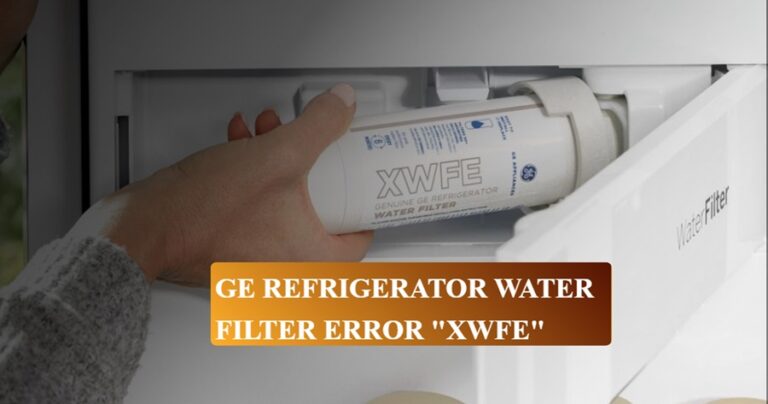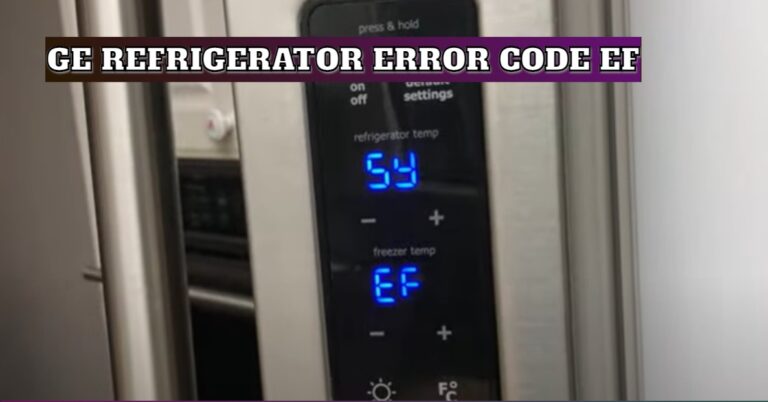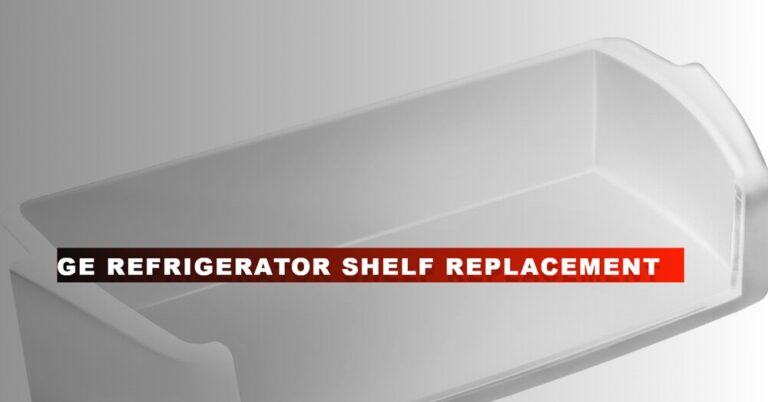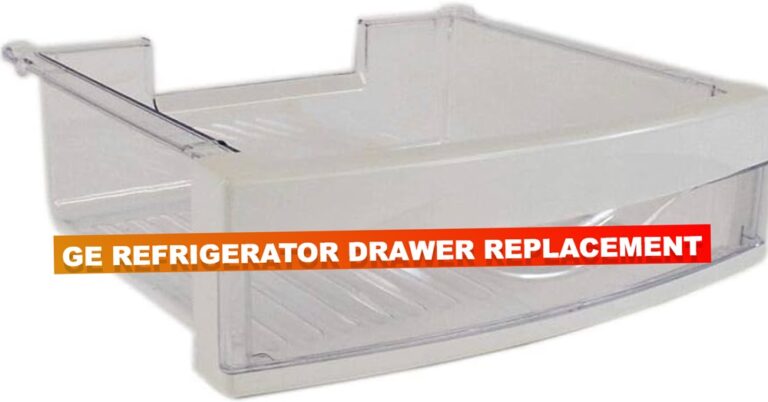If your GE refrigerator is making an intermittent buzzing noise, it is likely due to a faulty compressor or a malfunctioning condenser fan. Have you been hearing a buzzing noise coming from your GE refrigerator?
If so, it could be caused by a faulty compressor or a malfunctioning condenser fan. These issues can cause the refrigerator to vibrate and produce a buzzing sound. We will explore the possible reasons behind this noise and discuss how to troubleshoot and fix the problem.
By following these steps, you can quieten your refrigerator and ensure it continues to run smoothly. So, let’s dive into the details and get to the bottom of this annoying buzzing noise.
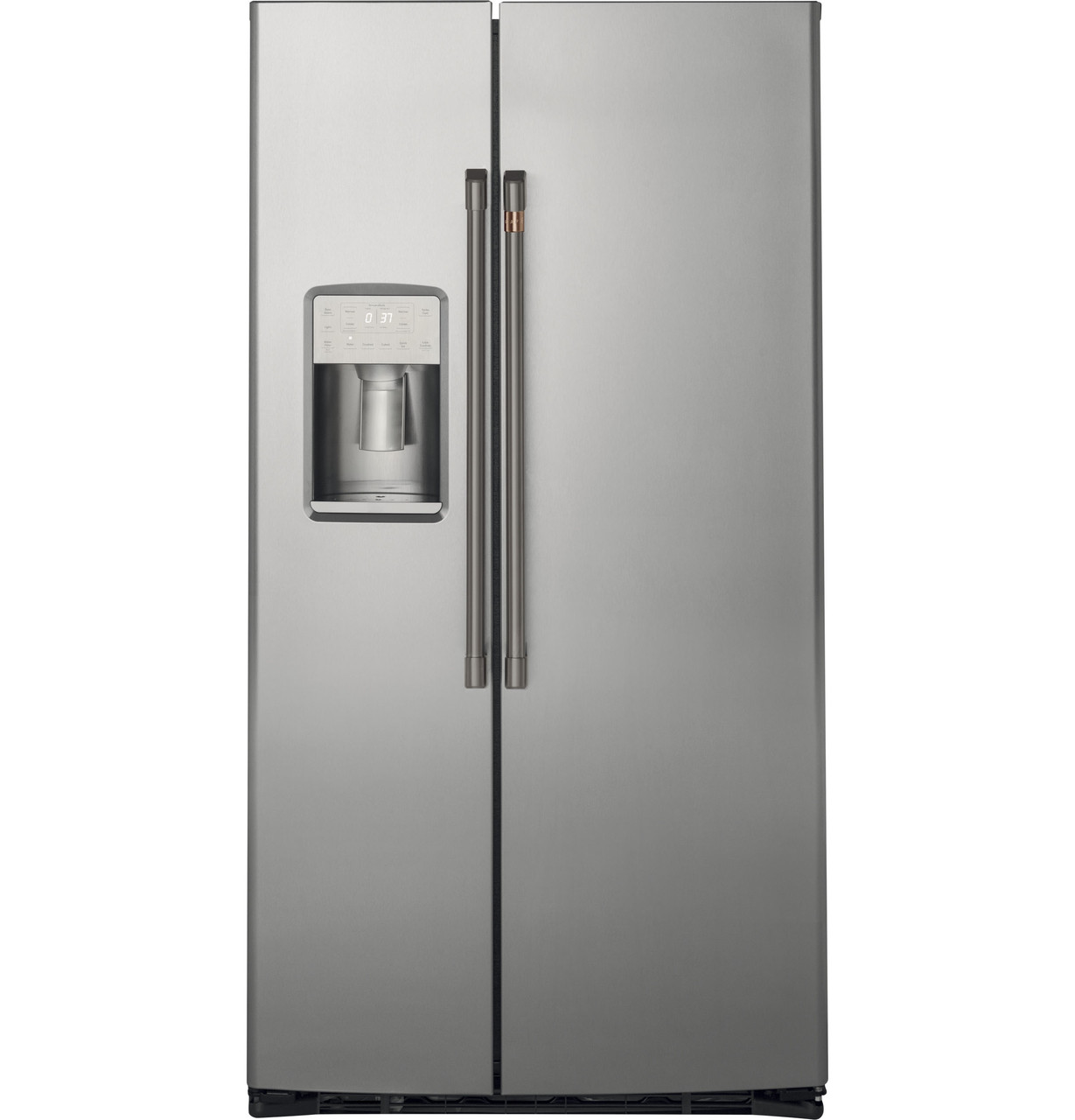
Credit: www.cafeappliances.com
Common Reasons For Intermittent Buzzing Noise
If your GE refrigerator is making an intermittent buzzing noise, there are a few common reasons to consider. It could be due to a faulty fan motor, a malfunctioning compressor, or an issue with the condenser coils. Regular maintenance and professional inspection can help diagnose and resolve the problem.
Faulty Compressor
If your GE refrigerator is producing an intermittent buzzing noise, one possible cause could be a faulty compressor. The compressor is responsible for circulating the refrigerant and maintaining the desired temperature inside the refrigerator.
When the compressor starts to malfunction, it can result in unusual noises, including a buzzing sound. It is essential to address this issue promptly to prevent further damage to your appliance.
Damaged Fan Motor
Another common reason for an intermittent buzzing noise in a GE refrigerator is a damaged fan motor. The fan motor is located in the freezer compartment and is responsible for circulating the air, allowing for proper cooling.
Over time, this motor can become worn out or damaged, causing it to make buzzing sounds during its operation. Ignoring this issue can lead to reduced cooling efficiency and potential food spoilage. Therefore, it is crucial to have the fan motor checked and replaced if necessary.
Clogged Condenser Coils
Clogged condenser coils can also be a culprit behind the intermittent buzzing noise in your GE refrigerator. The condenser coils are responsible for dissipating heat from the refrigerant as it flows through the system. When these coils become clogged with dust, debris, or pet hair, it restricts proper air circulation, resulting in increased strain on the compressor and other components.
This increased strain can lead to buzzing noises emanating from the refrigerator. Regularly cleaning and maintaining the condenser coils can help prevent this issue and ensure the optimal performance of your refrigerator.
To conclude, an intermittent buzzing noise in your GE refrigerator can be caused by various factors. It is crucial to identify and address the problem promptly to prevent further damage and maintain the efficient performance of your appliance.
Faulty compressors, damaged fan motors, and clogged condenser coils are three common reasons for such noises. If you are unsure about how to troubleshoot and fix the issue yourself, it is always recommended to seek professional assistance to ensure the safe and proper functioning of your GE refrigerator.

Credit: www.homedepot.com
Troubleshooting And Fixing The Issue
If your GE refrigerator is making an intermittent buzzing noise, it can be quite frustrating. However, there are several steps you can take to troubleshoot and fix this issue. In this section, we will guide you through the process of identifying the problem and finding a solution.
Cleaning The Condenser Coils
One common cause of a buzzing noise in a GE refrigerator is dirty condenser coils. Over time, these coils can become covered in dust, dirt, and debris, which can restrict airflow and cause the refrigerator to work harder than necessary. To clean the condenser coils:
- Unplug the refrigerator from the power source.
- Locate the condenser coils, typically located at the back of the refrigerator or beneath the unit.
- Using a vacuum cleaner with a brush attachment or a soft brush, gently remove any dust, dirt, or debris from the coils.
- Once the coils are clean, plug the refrigerator back in and listen for the buzzing noise. If the noise persists, move on to the next troubleshooting step.
Checking And Replacing The Fan Motor
If cleaning the condenser coils doesn’t resolve the buzzing noise, the next step is to check and potentially replace the fan motor. The fan motor is responsible for circulating air throughout the refrigerator and freezer compartments. To check the fan motor:
- Unplug the refrigerator from the power source.
- Locate the fan motor, typically found in the back of the freezer compartment behind an access panel.
- Inspect the fan blades for any obstructions or damage.
- If the fan blades appear to be in good condition, gently spin the fan blades to see if they rotate freely. If they do not, the fan motor may need to be replaced.
- If the fan motor needs to be replaced, consult the refrigerator’s user manual or contact a professional technician for assistance in ordering and installing the correct replacement.
Repairing Or Replacing The Compressor
If neither cleaning the condenser coils nor checking the fan motor resolves the buzzing noise, the issue may be with the compressor. The compressor is a vital component of the refrigerator’s cooling system. If it is malfunctioning, it may be necessary to repair or replace it.
Repairing or replacing the compressor is a complex task that should be performed by a qualified technician. Contact a professional for assistance if you suspect an issue with the compressor.
Preventive Maintenance Tips
If you own a GE refrigerator and you’ve noticed an intermittent buzzing noise, it’s important to take action before the problem worsens. Don’t worry, though! We’ve got preventive maintenance tips to help you fix this annoying issue and keep your refrigerator running smoothly.
Regular Cleaning And Maintenance
One of the easiest ways to prevent your GE refrigerator from making an intermittent buzzing noise is by regularly cleaning and maintaining it. Dust, dirt, and debris can accumulate on the condenser coils, causing the refrigerator to overwork and produce unusual noises. Here’s what you can do to keep these pesky particles at bay:
- Unplug the refrigerator and carefully remove the grille or kick plate at the bottom, which gives you access to the condenser coils.
- Gently vacuum or brush off any visible dirt or dust from the coils, taking care not to damage them. Remove any stubborn debris with a soft brush or cloth.
- Next, clean the interior of the refrigerator, including the shelves, drawers, and seals. Use a mild detergent and warm water solution to wipe away any spills or grime.
- Finally, don’t forget to clean the condenser fan. You can locate it behind the refrigerator, and it helps to circulate cool air. Dust off any accumulated debris to ensure optimal performance.
Keeping The Refrigerator Level
Another important preventive maintenance tip is to keep your GE refrigerator level. If the refrigerator is not properly leveled, it can cause the buzzing noise you’re experiencing. Follow these steps to ensure your refrigerator is on an even keel:
- Use a bubble level to check if the refrigerator is balanced. Place it on top of the refrigerator and adjust the leveling feet until the bubble is centered.
- If the leveling feet are damaged or worn out, consider replacing them to maintain the refrigerator’s stability.
- Check the floor underneath the refrigerator for any unevenness or dips. If necessary, place shims or adjust the floor to provide a level surface for the refrigerator.
Avoid Overloading The Refrigerator
Overloading your GE refrigerator can lead to excess strain on its components, which can result in buzzing noises. It’s important to properly organize and distribute the items in your refrigerator to avoid these issues:
- Avoid placing heavy or large items on the refrigerator shelves, as these can cause them to sag or break.
- Ensure there is enough space between items to allow for proper airflow. This helps maintain consistent temperatures and reduces the workload on the refrigerator.
- Regularly check the door gaskets and seals to ensure they are properly sealing. Faulty seals can cause warm air to enter the refrigerator, forcing it to work harder and potentially produce buzzing noises.
By following these preventive maintenance tips, you can keep your GE refrigerator in good condition and prevent the intermittent buzzing noise. Remember to clean and maintain it regularly, keep it level, and avoid overloading it. Your refrigerator will thank you with quiet and efficient performance!
When To Seek Professional Help
If you find that your GE refrigerator is making an intermittent buzzing noise, it can be frustrating and concerning. While some noise is expected from appliances, a persistent buzzing sound may indicate a problem that requires professional attention. In this section, we will discuss when it is necessary to seek the help of a professional to diagnose and fix the issue with your refrigerator.
Persistent Buzzing Noise
If the buzzing noise from your GE refrigerator persists and does not go away after a while, it is a good indication that something is not right. A constant buzzing sound could be a sign of a mechanical issue or a malfunctioning part. Attempting to fix it yourself without the necessary expertise may lead to further damage to your appliance. Therefore, it is wise to contact a professional when you notice a persistent buzzing noise.
Electrical Issues
In some cases, the intermittent buzzing noise coming from your GE refrigerator could be caused by electrical problems. Faulty wiring or a loose connection may result in strange sounds. Working with electricity can be dangerous, so it is crucial to let an experienced technician handle any electrical issues with your refrigerator. They have the knowledge and tools to identify and rectify these problems safely and effectively.
Warranty Coverage
If your GE refrigerator is still under warranty, it is advisable to seek professional help for any noise-related issues. Attempting to fix the problem on your own could void the warranty. By contacting a certified technician, you will not only ensure that the buzzing noise is properly addressed but also protect your warranty coverage.
The trained professionals will be familiar with the terms of your warranty and can provide the necessary repairs or replacements as needed. To conclude, when you notice a persistent buzzing noise coming from your GE refrigerator, it is essential to seek the assistance of a professional.
They have the expertise to identify and address the underlying issues that may be causing the noise. Whether it’s a mechanical problem, an electrical issue, or you want to ensure that your warranty coverage remains intact, turning to a professional is the best course of action.
Final Thoughts
If your GE refrigerator is making an intermittent buzzing noise, it could be a sign of a problem. Don’t ignore it – troubleshoot the issue to ensure optimal performance and prevent any potential damage.
Importance Of Addressing The Noise
It is crucial to address any buzzing noise coming from your GE refrigerator as soon as possible. Ignoring or dismissing it can lead to more significant problems down the line. Here’s why:
- Avoid Costly Repairs: Investigating and resolving the buzzing noise early on can prevent the need for expensive repairs in the future. Taking proactive steps now can save you both time and money in the long run.
- Prolong the Lifespan: An intermittent buzzing noise may indicate an underlying issue that can potentially damage your refrigerator over time. By addressing the noise promptly, you can prevent further damage and extend the lifespan of your appliance.
- Preserve Food Quality: A malfunctioning refrigerator can affect the temperature and humidity levels, compromising the freshness and quality of your food. Tackling the buzzing noise ensures your refrigerator functions optimally, keeping your perishables fresh for longer.
- Peace of Mind: Living with a buzzing refrigerator can be bothersome and disruptive, causing unnecessary stress or annoyance. By resolving the noise issue, you can enjoy a quieter and more peaceful environment in your kitchen.
Enjoying A Quiet And Efficient Refrigerator
Once you have identified and tackled the buzzing noise in your GE refrigerator, you can start reaping the following benefits:
- Peace and Quiet: Say goodbye to the annoying buzzing sound that interrupts the tranquility of your home. With the issue resolved, you can enjoy a calm atmosphere that allows you to focus on other activities.
- Energy Efficiency: A buzzing noise may indicate that your refrigerator is working harder than it should, potentially wasting energy. By fixing the noise issue, you can optimize the appliance’s performance, ensuring it operates efficiently and saves you money on utility bills.
- Improved Functionality: Addressing the noise can help identify and rectify any other underlying problems with your refrigerator that may negatively impact its performance. This ensures that all components are functioning properly, enhancing the overall functionality of the appliance.
- Long-Term Satisfaction: Eliminating the buzzing noise not only improves the immediate environment but also offers ongoing satisfaction. With a quiet and efficient refrigerator, you can enjoy the convenience and reliability it brings to your daily life.
Frequently Asked Questions For Ge Refrigerator Making Intermittent Buzzing Noise
Why Is My Ge Refrigerator Making An Intermittent Buzzing Noise?
The intermittent buzzing noise in your GE refrigerator may be caused by a malfunctioning condenser fan motor or a faulty compressor. These components can cause vibrations that result in the buzzing noise. It is recommended to have a professional technician inspect and repair the refrigerator to resolve the issue.
Can A Dirty Condenser Cause A Buzzing Noise In My Ge Refrigerator?
Yes, a dirty condenser can cause a buzzing noise in your GE refrigerator. When dust and debris accumulate on the condenser coils, it can hinder the airflow and strain the compressor. This strain can result in a buzzing noise. Cleaning the condenser coils regularly can help prevent this issue.
How Can I Fix The Buzzing Noise In My Ge Refrigerator Myself?
To fix the buzzing noise in your GE refrigerator, you can try the following steps:
- Unplug the refrigerator and locate the condenser fan motor.
- Inspect the motor for any obstructions or damage.
- If the motor is dirty, clean it using a soft brush or vacuum cleaner.
- Ensure all screws and bolts are tightly fastened.
- Plug the refrigerator back in and check if the buzzing noise persists.
- If the problem persists, it is advisable to seek professional help.
Conclusion
If your GE refrigerator is making an intermittent buzzing noise, there are a few potential causes to consider. It could be due to the fan motor, the condenser coils, or even a faulty compressor. By troubleshooting the issue and finding the root cause, you can take the necessary steps to resolve the problem and ensure that your refrigerator functions smoothly and quietly.
Remember to consult a professional if needed for a proper diagnosis and repair.
Hello Readers, I am Mechanic Shuvo, a seasoned refrigerator solution expert with over 11 years of hands-on experience in the field. Throughout my career, I've dedicated myself to understanding the ins and outs of refrigeration systems, honing my skills as a refrigerator mechanic. My passion for these appliances led me to create the website "refrigeratorsolutionsguide.com," where I aim to share my wealth of knowledge and expertise with others.
Over the years, I've encountered a wide range of refrigerator issues and have successfully resolved them all. From common problems like temperature fluctuations and strange noises to more complex technical issues, I've seen it all. Through my website, I hope to provide practical solutions, insightful tips, and guidance to help you keep your refrigerators running smoothly.


